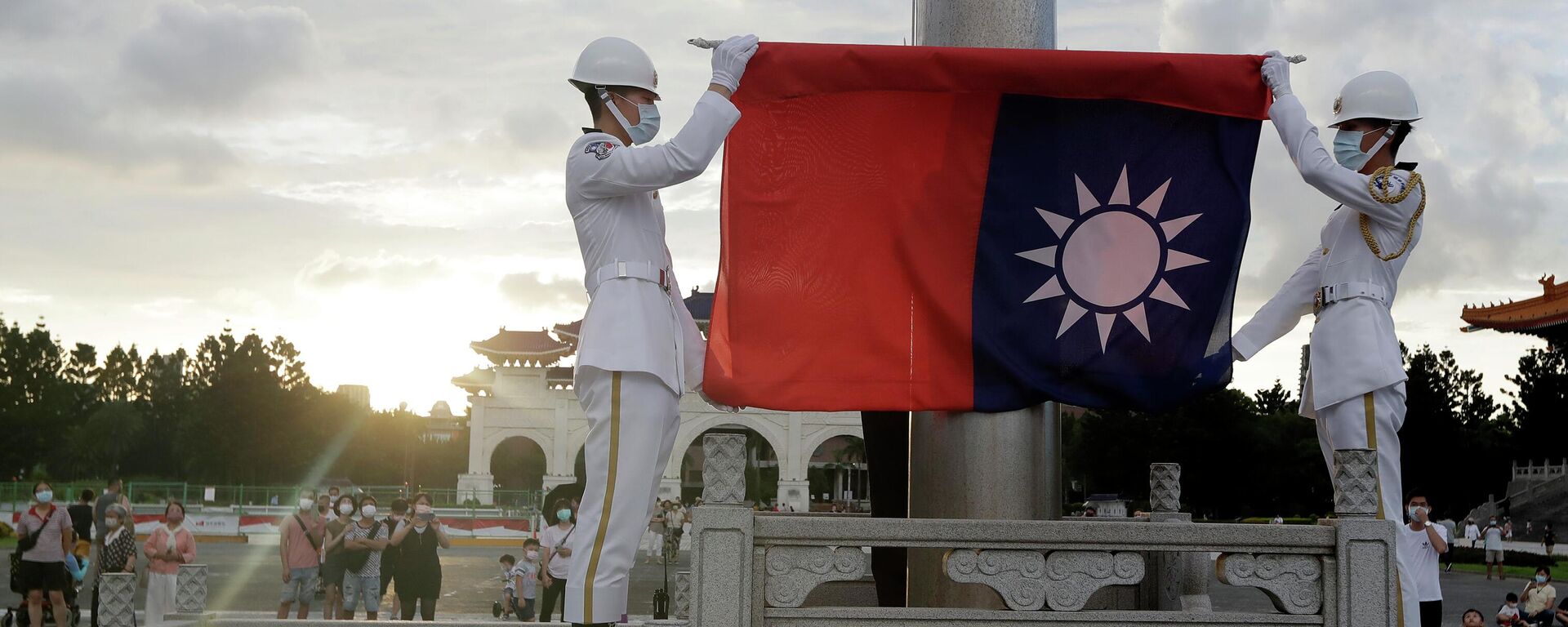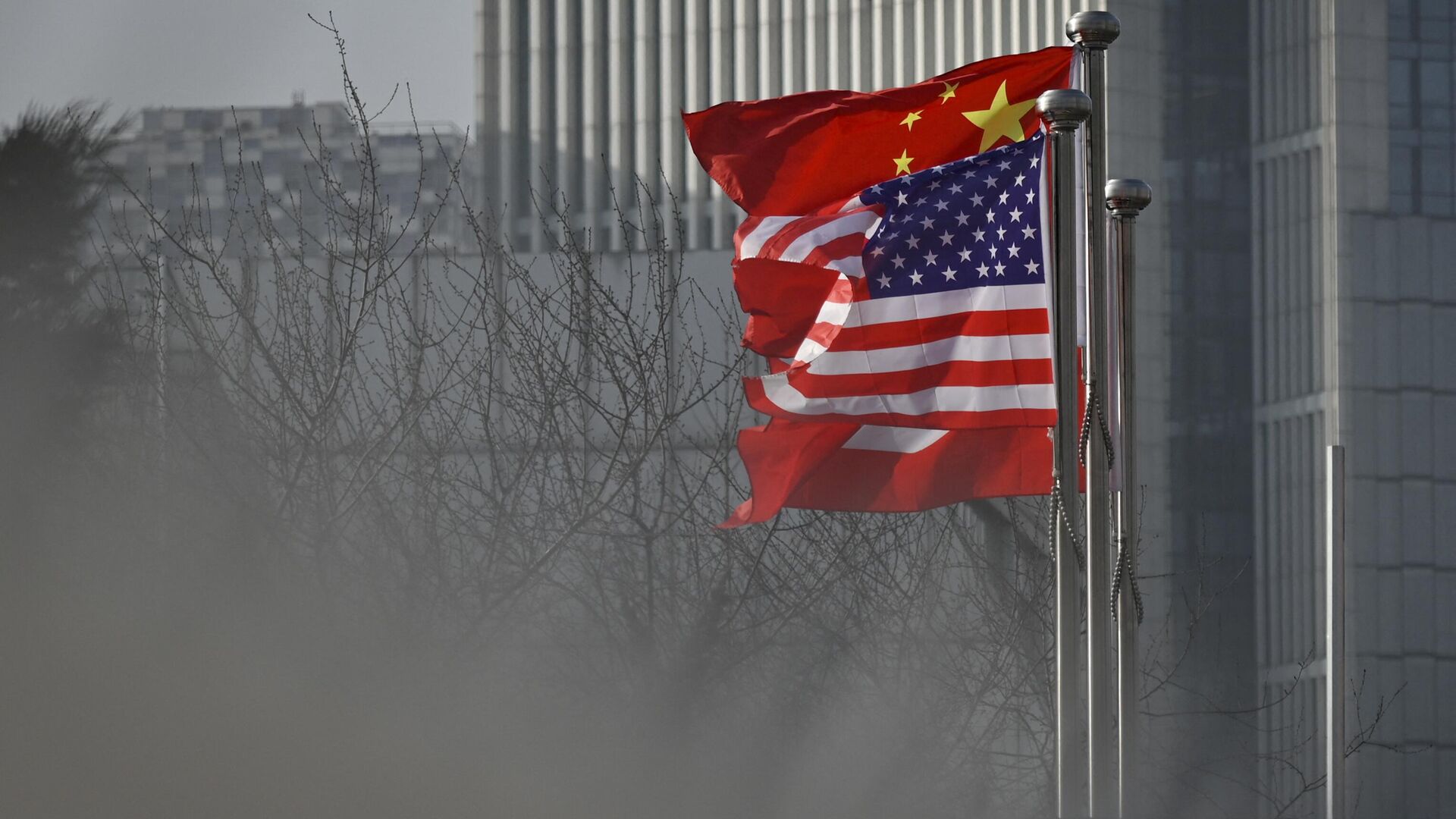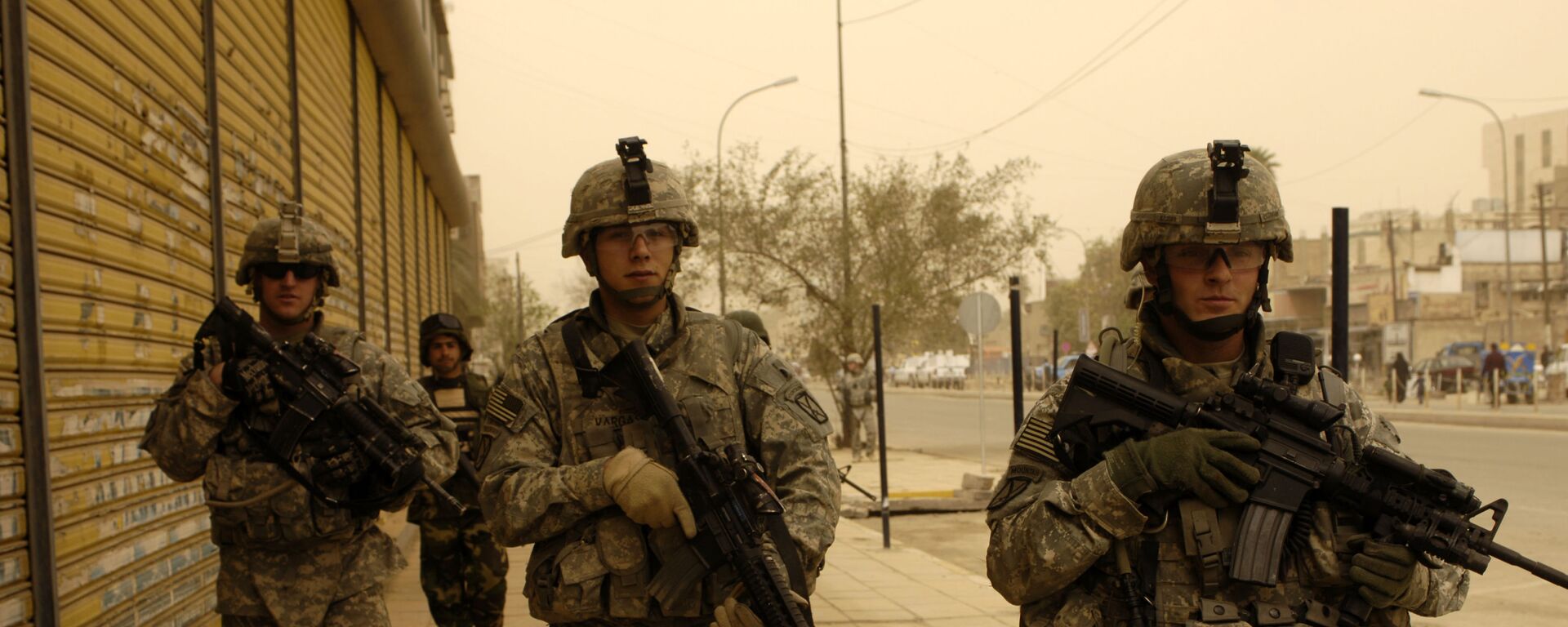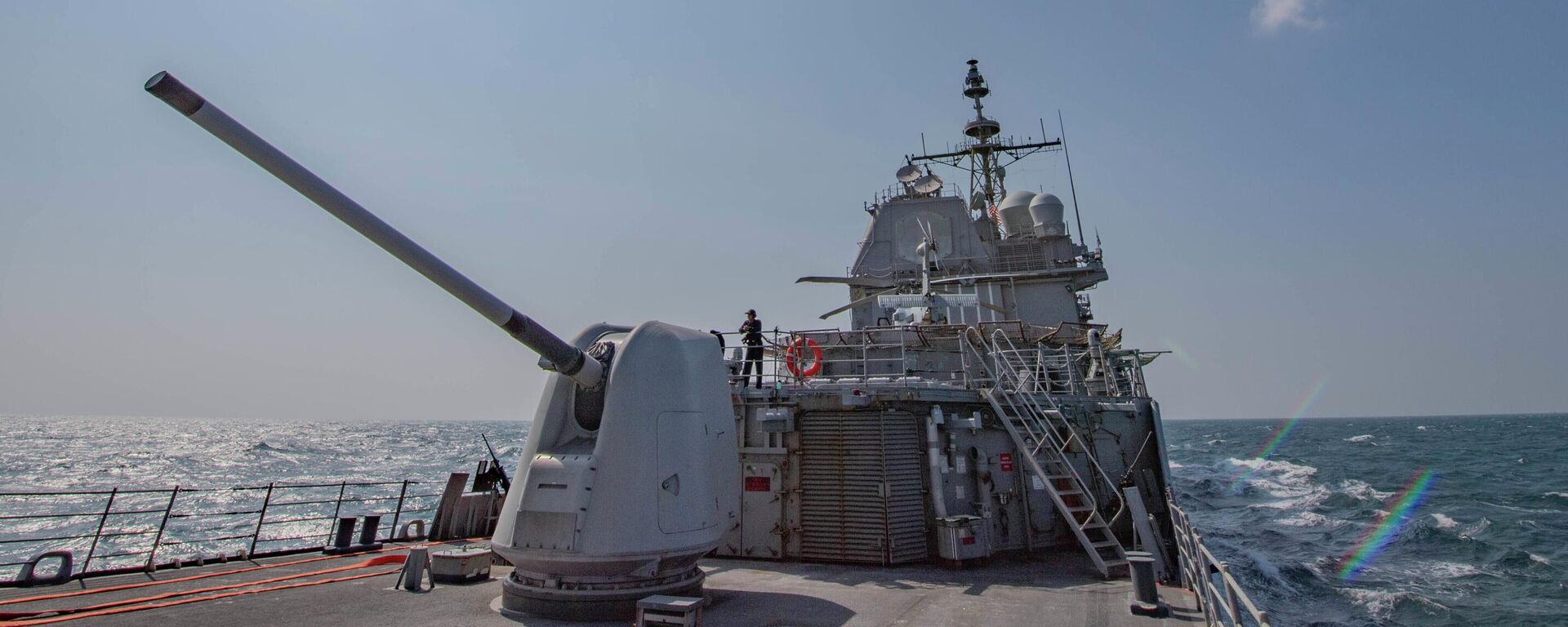https://sputnikglobe.com/20230308/make-love-not-war-us-should-focus-on-peace--stability-instead-of-egging-on-conflict-with-china-1108163065.html
Make Love, Not War: US Should Focus on Peace & Stability Instead of Egging on Conflict With China
Make Love, Not War: US Should Focus on Peace & Stability Instead of Egging on Conflict With China
Sputnik International
Tensions have been building between the United States and China, largely over the island of Taiwan and control of the South China Sea.
2023-03-08T02:13+0000
2023-03-08T02:13+0000
2023-06-19T12:46+0000
analysis
china
washington
war
world war iii
south china sea
taiwan
https://cdn1.img.sputnikglobe.com/img/07e7/03/05/1108061157_0:160:3055:1878_1920x0_80_0_0_a2ccebd94d71605d2bedf7ade88033ce.jpg
Michael Gordon, former national security correspondent for the New York Times and now with the Wall Street Journal, penned a piece published on Monday that said the United States is not ready for a conflict with China, with a focus on that country attempting to take Taiwan or control the South China Sea.According to Gordon, who cites classified Pentagon wargame simulations and quotes from former military personnel and officials, the United States has been too preoccupied with the war on terror to prepare for a potential battle with a more well-armed foe, like China.He also blames a lack of unity in Washington about the “urgency of the threat from Beijing” for the military not being prepared, despite what Gordon describes as an annual military budget of $800 billion.If the name Michael Gordon rings a bell to you, it may be because he infamously co-authored an article that ran in the New York Times that alleged Saddam Hussein had acquired “aluminum tubes” for use in Iraq’s non-existent nuclear weapons program. That assertion was a major component of the US government’s largely discredited case advocating for the invasion and occupation of Iraq.Gordon’s co-author in that article, Judith Miller, was the only US journalist known to be fired over the media’s reckless and guileless reporting of the Bush administration’s case for war in Iraq. Gordon, however, remained at the paper for years after.Prior to joining the Wall Street Journal and after his employment with the New York Times, Gordon would go on to work at two think tanks: the notoriously pro-war neoconservative Foundation for Defense of Democracies and the notoriously pro-war neoliberal think tank the Center for a New American Security.Now, the Wall Street Journal is giving him room to print a multi part "series" on why the United States needs to spend more on the military to prepare for a war in an "international era." What the article doesn’t address is if we should even want a war with China, even if it takes Taiwan or establishes further control in the South China Sea.The threat of a Chinese takeover of the South China Sea and Taiwan would be bad for the United States, Gordon writes, because it would give it control over trade routes that see trillions of dollars of trade annually. It would also control the supply of semiconductors and, most tellingly, would “challenge American pre-eminence in a part of the world it has dominated since World War II.”It is the last justification that showcases the true reason why the United States has taken such an aggressive stance with China as well as other countries who have questioned US hegemony, including Russia and Iran.Prior to World War II, it was generally accepted that major powers in the world had their own spheres of influence - the Monroe Doctrine is famous for expanding the US sphere of influence to include the entirety of the Western hemisphere. No foreign governments, besides our own, were to influence the affairs of governments in both North and South America. That was already a bold and convention-defying claim, but it became the US foreign policy modus operandi until the end of World War II.Then, with the onset of the Cold War, the US sphere encompassed the entire globe not covered by the growing sphere of influence of the USSR. After the fall of the USSR, the US decided its sphere of influence would be the entire globe.It was then that every conflict, no matter how small or insular, became the business of the US government. Occasionally, it was done with the support of the UN, but oftentimes it was not. Sometimes it was done with the support of NATO, sometimes not.The US has tasked the military with not only policing the globe but also developing the ability to tackle any adversary in any theater in the world. It is hardly a wonder that the massive military budget, which Gordon predictably underestimates by using only the Defense Department budget, is still not enough to accomplish that task.What the wargames and officials that Gordon quotes didn’t consider, is a scenario where China attacks the US on US soil or attacks a US neighbor - a scenario not being considered because it is deemed not realistic. The US is surrounded by two massive oceans and allies to the north and south. It also, notably, is not surrounded by Chinese military bases, like China is surrounded by US bases.If Puerto Rico seceded from the United States - unlike ties between Taiwan and China - and China tried to prevent a US invasion of the island, it would find itself in a far more difficult situation than the US would find itself in trying to prevent an invasion of Taiwan.But that raises the question, is it the job of the United States military to prevent powers from dealing with other entities that undoubtedly sit within their sphere of influence?Gordon quotes former Secretary of Defense Robert Gates, who contends the military mission is to do that while also continuing the wars of conquest that have made up the US foreign policy over the past 20 years.As for Gordon’s contention that China controlling the Sea of China would be bad for international trade, the assertion is not completely without merit. But major trade routes are typically controlled by the nation closest to that route.Still, the United States exerted near complete control of the Panama Canal for more than a century until it transferred control back to Panama and even today maintains the right to use military force to ensure the canal’s “neutrality.”Who controls the South China Sea is a matter of debate. China, Malaysia, the Philippines, Vietnam, Brunei and Taiwan all claim parts of the sea as their territorial waters. Japan also has an interest in the area because it is heavily dependent on trade from the area. Still, one thing that is clear is that the United States is not part of the group that has a claim on the South China Sea.The trade routes in the South China Sea are an issue for the parties directly involved and the United Nations to resolve. It is not, or at least shouldn’t be, the job of the United States military to secure every trade route of every nation it favors in the world.If it is, then Gordon’s assessment is correct. Our military is woefully underfunded for the job we tasked it with: the ability to fight China and Russia simultaneously while also continuing our “stirring of a hornets nest” strategy of fighting global terrorism. More than $800 billion annually is not enough to accomplish that. Neither is the actual number which easily tops $1 trillion annually. It’s unlikely that any budget, no matter how bloated, would be able to accomplish the task of keeping the entire planet within the sphere of influence of the United States.Gordon and his fellow warhawks are asking the wrong question. They worry that the United States is ill-prepared for a war with China instead of considering what could be done to prevent such a war. “Deterrence” they will say. If the US has enough weapons, China won’t want to invade Taiwan or fight for the South China Sea. But then Gordon points to an increasing Chinese military budget, in part created to counter the US military, as justification for even more weapons.The pattern is reminiscent of the Cold War, when the US and USSR competed in a nuclear arms race that resulted in enough weapons being created to destroy the planet countless times over.Getting into a conventional arms race with China is not only going to make a conflict between the two countries more likely, it will make that conflict more deadly than it would have been otherwise.Despite the wargame predictions, no one wins a war with China. Not the United States, not China and certainly not Taiwan. The best thing the US can do to promote peace and stability worldwide is to draw down its military forces and divert that money to ending poverty, both at home and worldwide. It certainly isn’t preparing for a war with China and increasing our military budget even further to facilitate that.
https://sputnikglobe.com/20210726/ex-cia-agent-says-us-wasted-trillions-on-wars-in-iraq--afghanistan-achieved-nothing-1083461497.html
https://sputnikglobe.com/20230228/beijing-puts-taiwan-reunification-plans-on-fast-development-track-chinese-lawmaker-says-1107880789.html
https://sputnikglobe.com/20220809/us-simulation-shows-china-would-sink-most-of-us-fleet-in-taiwan-invasion-reports-say-1099417247.html
china
washington
south china sea
taiwan
Sputnik International
feedback@sputniknews.com
+74956456601
MIA „Rossiya Segodnya“
2023
News
en_EN
Sputnik International
feedback@sputniknews.com
+74956456601
MIA „Rossiya Segodnya“
Sputnik International
feedback@sputniknews.com
+74956456601
MIA „Rossiya Segodnya“
war between us and china, wargame simulations, taiwan, south china sea
war between us and china, wargame simulations, taiwan, south china sea
Make Love, Not War: US Should Focus on Peace & Stability Instead of Egging on Conflict With China
02:13 GMT 08.03.2023 (Updated: 12:46 GMT 19.06.2023) Over the last several years, tensions between the United States and China have been building, largely over the island of Taiwan and control of the South China Sea but more recently after former House Speaker Nancy Pelosi's trip to the self-governing island.
Michael Gordon, former national security correspondent for the New York Times and now with the Wall Street Journal, penned a piece published on Monday that said the United States is not ready for a conflict with China, with a focus on that country attempting to take Taiwan or control the South China Sea.
According to Gordon, who cites classified Pentagon wargame simulations and quotes from former military personnel and officials, the United States has been too preoccupied with the war on terror to prepare for a potential battle with a more well-armed foe, like China.
He also blames a lack of unity in Washington about the “urgency of the threat from Beijing” for the military not being prepared, despite what Gordon describes as an annual military budget of $800 billion.
If the name Michael Gordon rings a bell to you, it may be because he infamously co-authored an article that ran in the New York Times that alleged Saddam Hussein had acquired “aluminum tubes” for use in Iraq’s non-existent nuclear weapons program. That assertion was a major component of the US government’s largely discredited case advocating for the invasion and occupation of Iraq.
Gordon’s co-author in that article, Judith Miller, was the only US journalist known to be fired over the media’s reckless and guileless reporting of the Bush administration’s case for war in Iraq. Gordon, however, remained at the paper for years after.
Prior to joining the Wall Street Journal and after his employment with the New York Times, Gordon would go on to work at two think tanks: the notoriously pro-war neoconservative Foundation for Defense of Democracies and the notoriously pro-war neoliberal think tank the Center for a New American Security.
Now, the Wall Street Journal is giving him room to print a multi part "series" on why the United States needs to spend more on the military to prepare for a war in an "international era." What the article doesn’t address is if we should even want a war with China, even if it takes Taiwan or establishes further control in the South China Sea. The threat of a Chinese takeover of the South China Sea and Taiwan would be bad for the United States, Gordon writes, because it would give it control over trade routes that see trillions of dollars of trade annually. It would also control the supply of semiconductors and, most tellingly, would “challenge American pre-eminence in a part of the world it has dominated since World War II.”
It is the last justification that showcases the true reason why the United States has taken such an aggressive stance with China as well as other countries who have questioned US hegemony, including Russia and Iran.
Prior to World War II, it was generally accepted that major powers in the world had their own spheres of influence - the Monroe Doctrine is famous for expanding the US sphere of influence to include the entirety of the Western hemisphere. No foreign governments, besides our own, were to influence the affairs of governments in both North and South America. That was already a bold and convention-defying claim, but it became the US foreign policy modus operandi until the end of World War II.
Then, with the onset of the Cold War, the US sphere encompassed the entire globe not covered by the growing sphere of influence of the USSR. After the fall of the USSR, the US decided its sphere of influence would be the entire globe.
It was then that every conflict, no matter how small or insular, became the business of the US government. Occasionally, it was done with the support of the UN, but oftentimes it was not. Sometimes it was done with the support of NATO, sometimes not.
The US has tasked the military with not only policing the globe but also developing the ability to tackle any adversary in any theater in the world. It is hardly a wonder that the massive military budget, which Gordon predictably underestimates by using only the Defense Department budget, is still not enough to accomplish that task.
What the wargames and officials that Gordon quotes didn’t consider, is a scenario where China attacks the US on US soil or attacks a US neighbor - a scenario not being considered because it is deemed not realistic. The US is surrounded by two massive oceans and allies to the north and south. It also, notably, is not surrounded by Chinese military bases, like China is surrounded by US bases. If Puerto Rico seceded from the United States - unlike ties between Taiwan and China - and China tried to prevent a US invasion of the island, it would find itself in a far more difficult situation than the US would find itself in trying to prevent an invasion of Taiwan.
But that raises the question, is it the job of the United States military to prevent powers from dealing with other entities that undoubtedly sit within their sphere of influence?

28 February 2023, 20:04 GMT
Gordon quotes former Secretary of Defense Robert Gates, who contends the military mission is to do that while also continuing the wars of conquest that have made up the US foreign policy over the past 20 years.
Gates said that while serving for the Bush and Obama administrations he tried to stress “the need to prepare for future potential large-scale conflict with Russia and China while properly funding the long-term ability to deal with smaller-scale conflicts we were most likely to face in the future.”
As for Gordon’s contention that China controlling the Sea of China would be bad for international trade, the assertion is not completely without merit. But major trade routes are typically controlled by the nation closest to that route.
Still, the United States exerted near complete control of the Panama Canal for more than a century until it transferred control back to Panama and even today maintains the right to use military force to ensure the canal’s “neutrality.”
Who controls the South China Sea is a matter of debate. China, Malaysia, the Philippines, Vietnam, Brunei and Taiwan all claim parts of the sea as their territorial waters. Japan also has an interest in the area because it is heavily dependent on trade from the area. Still, one thing that is clear is that the United States is not part of the group that has a claim on the South China Sea.
The trade routes in the South China Sea are an issue for the parties directly involved and the United Nations to resolve. It is not, or at least shouldn’t be, the job of the United States military to secure every trade route of every nation it favors in the world.
If it is, then Gordon’s assessment is correct. Our military is woefully underfunded for the job we tasked it with: the ability to fight China and Russia simultaneously while also continuing our “stirring of a hornets nest”
strategy of fighting global terrorism. More than $800 billion annually is not enough to accomplish that. Neither is the actual number which easily tops $1 trillion annually. It’s unlikely that any budget, no matter how bloated, would be able to accomplish the task of keeping the entire planet within the sphere of influence of the United States.
Gordon and his fellow warhawks are asking the wrong question. They worry that the United States is ill-prepared for a war with China instead of considering what could be done to prevent such a war. “Deterrence” they will say. If the US has enough weapons, China won’t want to invade Taiwan or fight for the South China Sea. But then Gordon points to an increasing Chinese military budget, in part created to counter the US military, as justification for even more weapons.
The pattern is reminiscent of the Cold War, when the US and USSR competed in a nuclear arms race that resulted in enough weapons being created to destroy the planet countless times over.
Getting into a conventional arms race with China is not only going to make a conflict between the two countries more likely, it will make that conflict more deadly than it would have been otherwise.
Despite the wargame predictions, no one wins a war with China. Not the United States, not China and certainly not Taiwan. The best thing the US can do to promote peace and stability worldwide is to draw down its military forces and divert that money to ending poverty, both at home and worldwide. It certainly isn’t preparing for a war with China and increasing our military budget even further to facilitate that.





